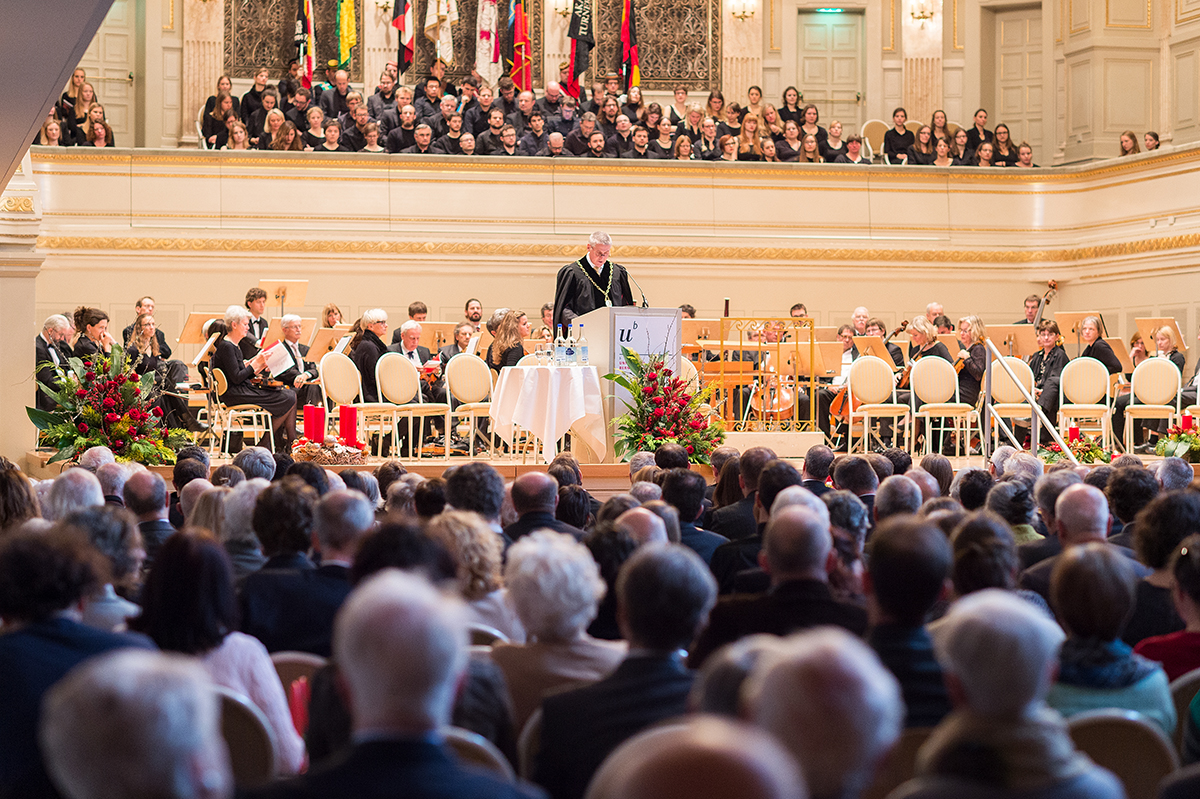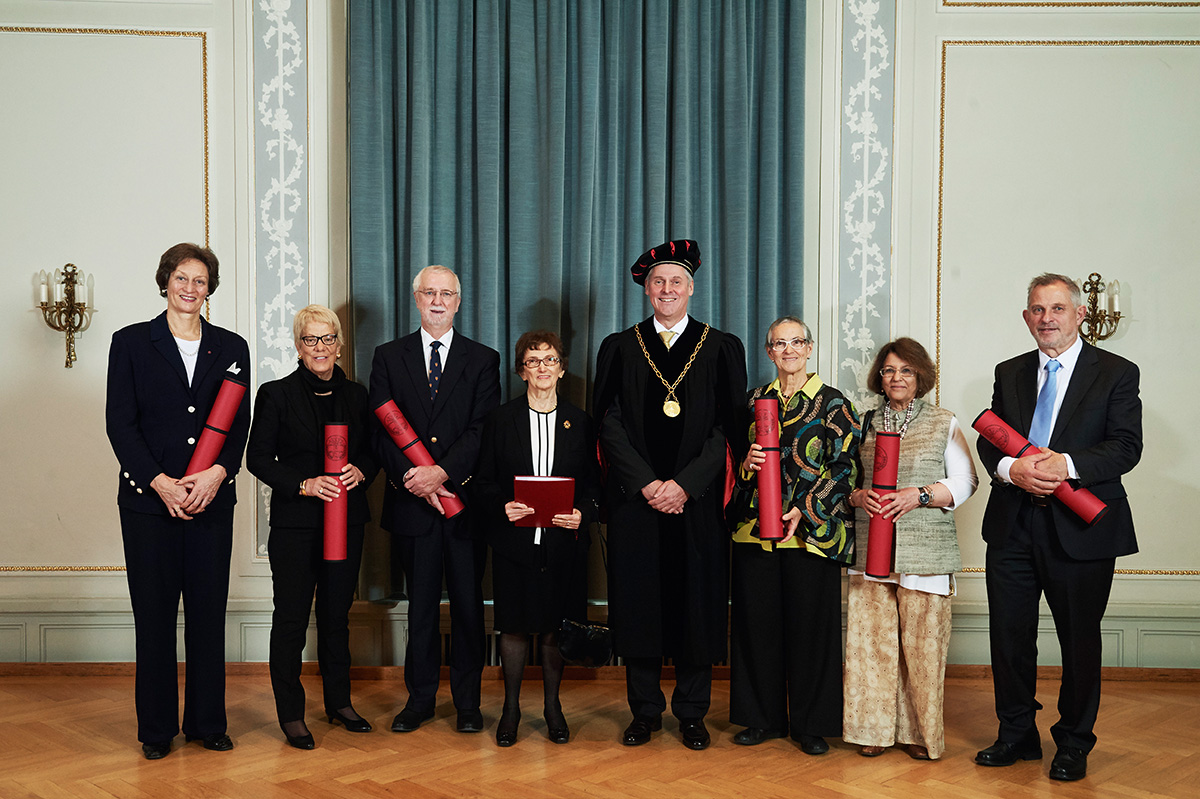Doing well and talking about it
At the 182th University of Bern Dies academicus, the Rector Christian Leumann addressed the opportunities and challenges facing the University. Bernhard Pulver of Bern’s Executive Council spoke of being “immensely proud” of the performance of the University of Bern, and cited education policy as one reason for it success. Improved access to science for marginalised sections of society was called for by student representative Pia Portmann. Seven honorary doctorates were presented, fourteen researchers received academic awards and the philanthropist Celia Zwillenberg was named honorary senator.
The Rector, Christian Leumann, explored the advance of technology, which he sees as bringing not just benefits to society but also numerous challenges such as Industry 4.0, digitalisation, gene technology and our unsustainable economic footprint. He argued that in the uncertain environment that has emerged, it is the role of universities to find out the facts and to anticipate the opportunities and risks of this social development: complex problems such as migration and human genetic engineering demand an interdisciplinary approach. As the University of Bern teaches all major subjects and has set up new joint faculty research partnerships, its “broad academic profile” puts it “in an excellent position”.
The University of Bern is amongst the best worldwide
Mr Leumann sees rankings for measuring university performance as providing a useful indication of certain trends such as the rise of the Asian universities. He explained that the University of Bern was in the top one percent in the world, and had ever improved its position over recent years in terms of citations and publications. In terms of reputation, however, the University had lost ground. “We are in the paradoxical situation of being shown to perform well, but not being recognised for that success.” Leumann concludes that the University needs not just to “do well, but also [to] talk about it”. The future strategic goals include a focus on medicine and medical technology. Examples such as the ARTORG research centre, the SITEM-Insel university hospital network and an increase in the number of students in medicine show, Mr Leumann believes, that the University of Bern can play a leading part in healthcare development and research across Switzerland.
Finance and promoting early career researchers
One challenge is and remains university finance, explained Mr Leumann. He believes that the University will in future have to rely on a larger proportion of competitive external funding from state funding agencies (SNF, ERC). Access to European funding in his view remains uncertain, partly because of the mass immigration initiative. Mr Leumann sees cooperation with partners from industry and private donors as an additional finance option. “How else can we improve the practical implementation of findings from basic university research if not in exchange with industry?” The University of Bern had long since developed guidelines to ensure the independence of teaching and research.
“The success of the University of Bern is striking”
The Director of Education Bernhard Pulver was convinced that even St Nicholas would have a positive review of the year if he stopped off in Bern.“The success of the University of Bern is striking.”He gave the planned crash of the Rosetta space probe as an example of the successful completion of a Bern research project, and one that had inspired a global media response. Bern is, he argued, the undisputed leader in Switzerland for National Centres of Competence in Research – home to four NCCR and with joint responsibility for a fifth. The University of Bern is also succeeding at an international level, believes Mr Pulver: the University now leads four major collaborative EU research projects as part of Horizon 2020.
Mr Pulver argued that academic and scientific success was also paying in financial terms. The University had acquired external funding of around 260 million francs, equal to nearly a third of the total budget of the University. Developments in the promotion of early career researchers was equally encouraging. “Believe it or not, thirteen new professorships were awarded to the University of Bern this year by the Swiss National Science Foundation – more than ever before.” The large number of students from other cantons and from abroad who are coming to Bern, and the high employment rate amongst Bern graduates, are in Mr Pulver’s view testimony to the quality of teaching and training here.
The secret to success
What is the secret to such a great success? Mr Pulver highlighted how institutions accept and engage with individuals. He stressed the importance of continuing to give people throughout the education sector enough space and freedom. “A positive approach to people, freedom and responsibility are important factors in a successful university.” It was up to politicians to create the right conditions, argued Mr Pulver, pointing to the Canton of Bern’s work on consolidating its top position as a centre of medicine, a process in which “the University plays a key role”. He thanked the Grand Council for avoiding pitting vocational training against universities, and the Swiss parliament for approving 400 million francs more for research and education for the next four years than the Federal Council had applied for. Mr Pulver ended his speech with these words: “in all its disciplines, the University of Bern contributes to the development of the global body of scientific and academic knowledge, and to the adventure of being human”.
Facilitating access to knowledge
Pia Portmann from the University of Bern’s student representative body SUB, spoke about knowledge, how it is produced and who is able to produce it. She reminded the audience that knowledge signifies not just cultural capital, but also power, and that its potential should not be underestimated. “We are the ones who can decide what should be investigated, researched and taught. We determine what questions are asked and which perspectives are taken, which topics are explored and ultimately the direction that research takes.” She argued that for that very reason, there needs to be an awareness of the responsibility that the production of knowledge brings.
Ms Portmann highlighted the fact that many people have only limited access to knowledge and therefore to the potential power and capital that knowledge offers. “Many voices have been and unfortunately stills are marginalised at times of major historical developments.” She demanded that every person should have the opportunity to develop his or her skills and to engage with science and research. “That is why the SUB is calling for lower access fees, a better system of grants and scholarships, a wide range of courses without evaluation of individual subjects, and the integration of all people regardless of their cultural or socioeconomic background.”
Awards and prizes
The speeches were followed by the official presentation of seven honorary doctorates. Fourteen researchers were also awarded academic prizes, and the philanthropist and biochemist Celia Zwillenberg was named honorary senator.
For the speeches in full, profiles of the laureates and pictures of the event, please visit the website of the Dies academicus.
2016/12/03


